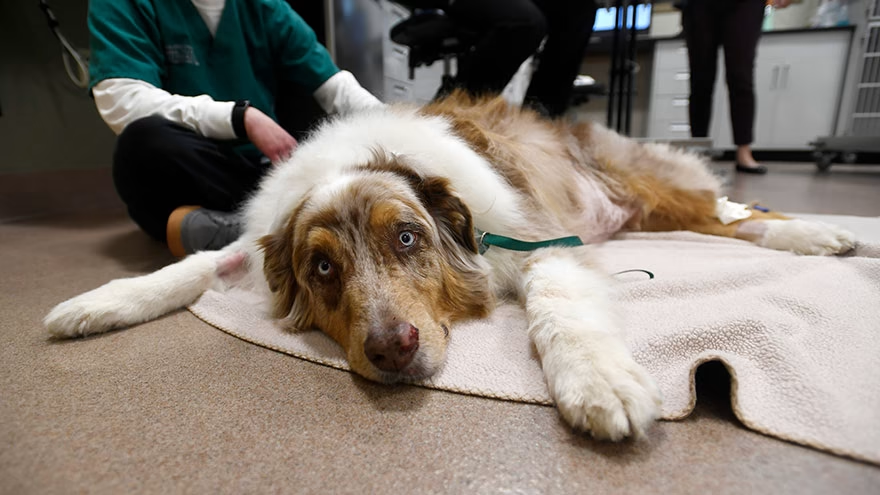Canines may build up a few kinds of intestinal malignant growth, and the visualization relies upon different components. As with any cancer, early detection and treatment generally offers better survival odds, but often canine intestinal cancer isn't diagnosed until it is already advanced. If your dog exhibits any sign of gastrointestinal upset -
- notably if he's middle-aged or older -
- take him to the vet for an examination.

Types of Intestinal Tumors
In dogs, the majority of intestinal tumors form in the rectum and colon. The most common type of large intestine canine tumor is adenocarcinoma, and it also appears in the stomach and small intestine. Lymphoma also affects the intestines. Other types of intestinal tumors include leiomyomas, leiomyosarcomas and adenomas.
Affected Breeds
Any dog can develop intestinal cancer, but certain breeds appear genetically predisposed. These include:- The German shepher
- The Belgian malinois
- The collie.
Intestinal Cancer Symptoms
Many types of intestinal cancer share similar symptoms. These include:- Vomiting
- Diarrhea
- Weight loss
- Fever
- Appetite loss
- Black, tarry stools
- Abdominal pain.
Diagnosis and Treatment
Your vet diagnoses your dog via an abdominal ultrasound, along with X-rays. The latter may include radiographs of other parts of the body, to see if the cancer has spread. Your vet may perform an endoscopy on your dog to view the gastrointestinal tract and take a sample for biopsy. Blood tests and a urinalysis also are conducted to determine your dog's general health.Treatment almost always consists of tumor removal, unless the dog is so old or debilitated that surgery is contraindicated. Surgery may be followed by chemotherapy. Your vet may prescribe pain medication for your dog if the cancer is advanced.
Intestinal Cancer Prognosis
Your dog's prognosis depends on the type of cancer and whether or not it has metastasized, or spread. While adenocarcinomas have a high rate of metastasis, leiomyomas are often solitary tumors and -- if they haven't spread -
- removing the mass essentially cures the dog. The National Canine Cancer Foundation states that the median survival time for a dog with colorectal adenocarcinoma is about 22 months. Those with adenocarcinoma of the small intestine generally don't survive more than four months, while dogs with lymphoma may only survive a little over three months. Your vet will give you a better idea of your pet's individual prognosis.
You Might Also Like :: Isolation Requirements for Dogs With Kennel Cough





0 Comments
No comments yet. Be the first to share your thoughts!
Leave a Comment